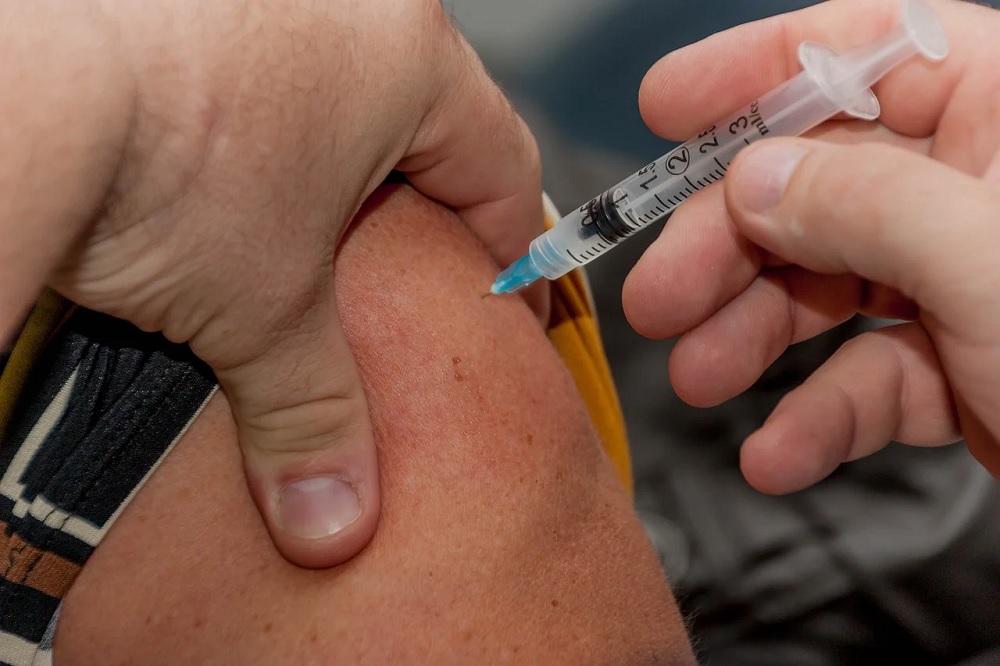Universal flu jab ‘could be available within five years’

A jab that protects against every form of flu could be available within five years, scientists have said, after a “promising” trial in animals.
The influenza virus is constantly evolving so new vaccines are needed each year to keep it at bay.
But researchers in the US said their “innovative” approach targets a part of the virus that does not mutate.
An early trial in monkeys showed the vaccine technology, which was designed based on a 100-year-old virus, generated “a robust immune response” against a modern variant.
‘One and done’
The researchers said their work raises hope that a “one and done” vaccine that confers lifelong immunity against an evolving virus could be on the horizon.
Jonah Sacha, a professor at the Oregon Health & Science University in the US, said: “It’s exciting because in most cases, this kind of basic science research advances the science very gradually; in 20 years, it might become something.
“This could actually become a vaccine in five years or less.”
Current flu vaccines target proteins that protrude from the surface of the virus, known as spike proteins.
But spike proteins can evolve to elude antibodies, which are produced by the body’s immune system to defend against the virus.
Prof Sacha said the flu virus is “always evolving the next variant and we’re always left to chase where the virus was, not where it’s going to be”.
HIV
For the study, published in the journal Nature Communications, the researchers used a vaccine technology that was originally developed to fight HIV.
It works by using a harmless herpes virus, called cytomegalovirus (CMV), to deliver a piece of genetic code from the flu virus to the cells in the body to mimic an infection.
The researchers said this vaccine platform is designed to target the core of the virus, which unlike spike proteins, does not mutate over time.
The team tested the jab on 11 monkeys infected with H5N1 – a bird flu virus that experts believe has the potential to become the next human pandemic.
But the technology was based on a deadly virus from a century ago that killed around 50 million people worldwide.
Six monkeys inoculated against 1918 Spanish flu survived exposure to more contemporary H5N1, the researchers said.
In contrast, unvaccinated monkeys in the control group exposed to the H5N1 virus succumbed to the disease, they added.
Scientists said their approach targets a specific type of immune cells in the lungs known as effector memory T cells, which is able to recognise proteins in the core of the virus that do not evolve.
Prof Sacha said: “It worked because the interior protein of the virus was so well preserved.
“So much so, that even after almost 100 years of evolution, the virus can’t change those critically important parts of itself.”
Pandemic
The team said the study also raises the potential for developing a vaccine against H5N1 in people.
Douglas Reed, associate professor of immunology at the University of Pittsburgh’s Centre for Vaccine Research in the US, said: “Should a deadly virus such as H5N1 infect a human and ignite a pandemic, we need to quickly validate and deploy a new vaccine.”
The researchers said their vaccine technology, which is licensed by immunology company Vir Biotechnology, could also work on other viruses, such as Sars-CoV-2, which causes Covid-19, to deliver long-lasting immunity.
Prof Sacha said: “It’s a massive sea change within our lifetimes.
“There is no question we are on the cusp of the next generation of how we address infectious disease.”
The research was supported by the Bill & Melinda Gates Foundation and the National Institutes of Health in the US.
Support our Nation today
For the price of a cup of coffee a month you can help us create an independent, not-for-profit, national news service for the people of Wales, by the people of Wales.





Good news. I also hear they are now trialling a combined flu/covid.
Cytomegalovirus is not a harmless virus but has a complicated association with various human diseases. Likely the version used has been altered. Nevertheless there is the possibility of creating a new pathogen. This is not a new idea – the original Smallpox vaccine is a hybrid virus ( Vaccinia) which has obscure origin but replaced Cowpox as the mild infection giving immunity to Smallpox.